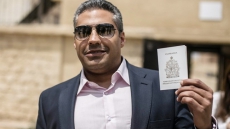Thousands of Hindus in Trinidad and Tobago converged at beaches and along river banks to immerse the idols of Lord Ganesh, marking the end of a 10-day-long festival honouring the elephant-headed god.
The immersion took place on Sunday following the worldwide observance of Ganesh Utsav which began on September 16.
The end of the celebration was preceded with special prayer sessions, satsangs and yajnas at over 400 temples and at private residences in the Caribbean nation.
Hindus had abstained from all forms of alcohol, meat and merriment for several weeks preceding this period.
According to Pundit Ramesh Tiwari, spiritual leader of the Edinburgh Hindu temple, Lord Ganesh is revered by devotees as the remover of all obstacles and the bestower of wisdom.
"The elephant-headed deity is known as the son of Goddess Parvati, the Consort of Lord Shiva. Hindu mythology claims that Lord Ganesh was created from the sweat of Parvati and as she prepared for the ritual bath she told Ganesh not to allow anyone to invade her privacy. Lord Shiva appeared and was refused entry which infuriated him and in anger he cut off Ganesh's head, Later, an elephant's head was transplanted in its place," Tiwari said.
Pundit Seereeram Maharaj, spiritual leader of the Caparo Shiva Kailash Mandir said: "In the midst of all this religious fervour, we must ensure that all idols are environmentally-friendly to help create a cleaner and healthier society."
"This is an imperative which I am urging the thousands of devotees to comply with," he added.
Hinduism was introduced here between 1845 and 1917 when over 148,000 East Indians were brought here from India, principally Uttar Pradesh and Bihar, to work on enhancing the agricultural capacity of the then colony's economy, principally sugar and cocoa.
Out of a population of 1.3 million people in Trinidad and Tobago, 44 percent are East Indians -- but just about 25 percent are devout Hindus.



